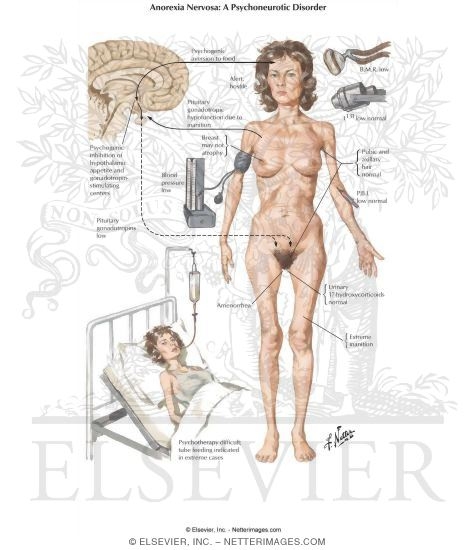
ALSO KNOWN AS
Eating disorder
DESCRIPTION
* In this condition, the individual has a distorted body image of normal weight. He/she may also have a fear of becoming fat. The individual uses starvation and/or exercise in order to achieve abnormally low weight.
SYMPTOMS
* Loss of sexual interest
* Extensive exercise habits
* Elaborate eating rituals
* Decline in cognitive functions, exemplified by learning difficulties in school
* Social isolation
* Blotchy skin
* Refusal to maintain body weight
* 25% or more weight loss
* Distorted body image
* Cold intolerance
* Constipation
CAUSE
* Distorted body image
* Fear of weight gain
* Fear of loss of control over food intake
* Depression
* Models/actresses as the standard for "normal" (who themselves are often anorexic)

HOW THE DIAGNOSIS IS MADE
* Dental cavities
* Depression may be identified
* Body weight 15% below expected
* Emaciation
* In females, absence of three consecutive menstrual cycles
* Low heart rate
* Low basal body temperature
* Loss of body fat
* Dry Scaly Skin
* Increased lanugo (fine "baby" hair)
* Enlargement of glands in front of ears (parotid gland enlargement)
* Leg swelling
* Laboratory work up may include a Complete blood count with differential (may show white blood cells and a low CD4/CD8 ratio and anemia), chemistry panel (may show abnormal liver enzymes and high cholesterol), hormone levels (Low T3, low FSH, low LH, low leptin, high growth hormone, high vasopressin and Cortisol levels), urine analysis, and EKG (prolonged Q-T interval).
TREATMENT
* Psychiatric/behavioral team experienced with anorexia
* Hospitalization may be necessary.
* Antidepressants may be considered.
* Intravenous nutritional support if Malnutrition is severe
SIMILAR CONDITIONS
* Bulimia Nervosa
* Addison's Disease
* Hyperthyroidism
* Diabetes Mellitus
* Celiac Sprue
* Crohn's Disease
* Lymphoma
* Tuberculosis
* Pituitary disorder
MISCELLANEOUS
* Social Considerations
1. Current societal admiration for thinness as a sign of beauty/attractiveness has contributed to the problems of distorted body image held by many anorexic women. Thirty years ago, most of the actresses/models of today would be considered "tomboyish" and "masculine."
2. The phenomenon of anorexia (and bulimia) is a strong indication of the need to empower individuals not to have their bodies and souls controlled by fluctuating and illogical standards, as dictated and fostered by the media.


I'm sick of people telling me its just a phase when I know people out there dying from eating disorders! Lend a hand; don’t avoid the problem people.
ReplyDeletehttp://www.eatingdisorder.com/anorexia-nervosa.html?utm_source=blog&utm_medium=pv&utm_content=zs&utm_campaign=anorexia